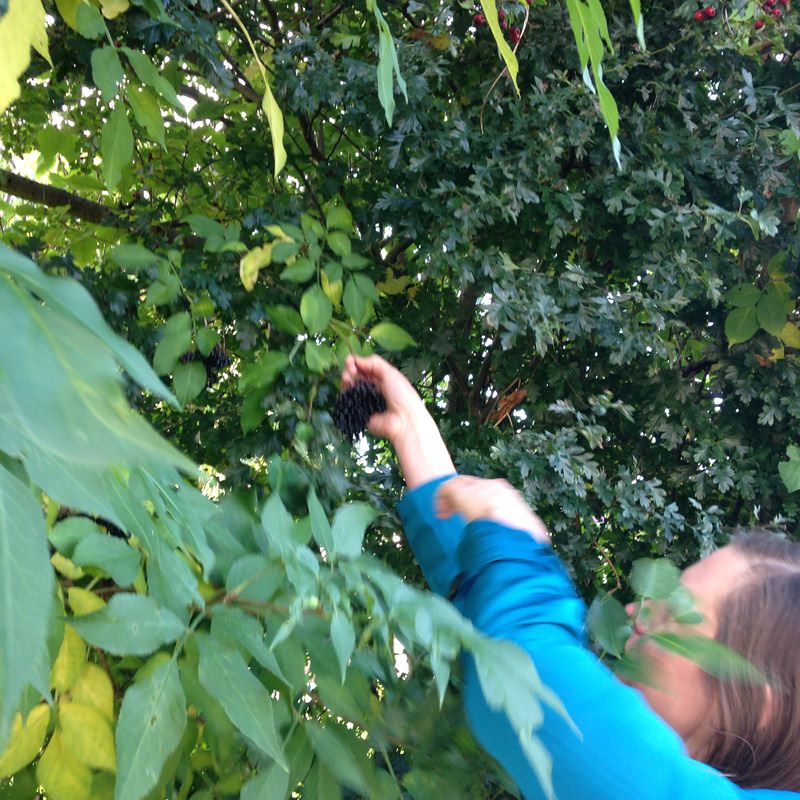
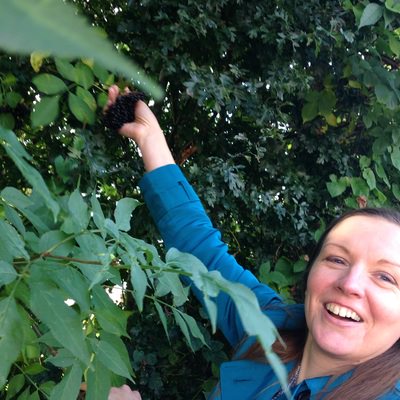

Whilst I pride myself on having a strong understanding of the science behind herbal medicine (I have a BSc degree in Phytotherapy, which includes study of the medical sciences such as Anatomy and Physiology, Biochemistry, Differential Diagnosis, Medicine, Pathology and Pharmacology as well as Botany and Herbal Materia Medica) there is something deliciously ‘witchy’ about making your own medicines. Particularly if you do this with plants you have either grown yourself or foraged. This can be as simple as picking a few fresh leaves of Lemon Balm to make a tea to ease a headache, throwing a handful of chamomile into a bath to calm a fractious child before bedtime or making tinctures (alcoholic extraction of herbs) and herb syrups.
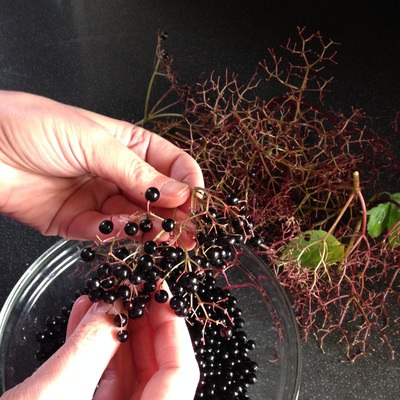
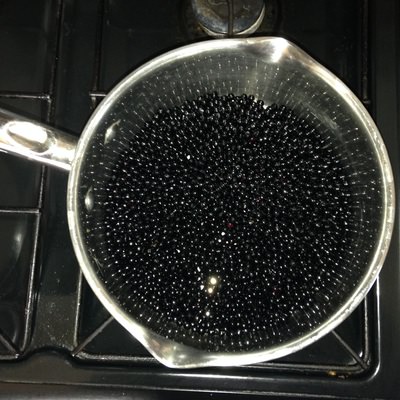

At this time of year I tend to spend a lot of time peering into bushes and trees, looking for berries and hips at their perfect moment of ripeness and I did struggle to contain my excitement on the school run when I spotted some elderberries finally ready for me to steal (ahem) forage. I am always mindful not to overharvest when foraging, all berries are primarily over-winter food for birds; therefore I never take all the berries off a tree, only taking those that are easy to reach, leaving those higher up for our feathered friends. Once the kids were dropped off at school I was straight back with my basket to collect enough berries to boost our immunity over the autumn and winter months.
The Elder Tree (Sambucus nigra)
The Elder has been used since ancient times for its medicinal properties. In fact it was once considered to be the “Medicine”.
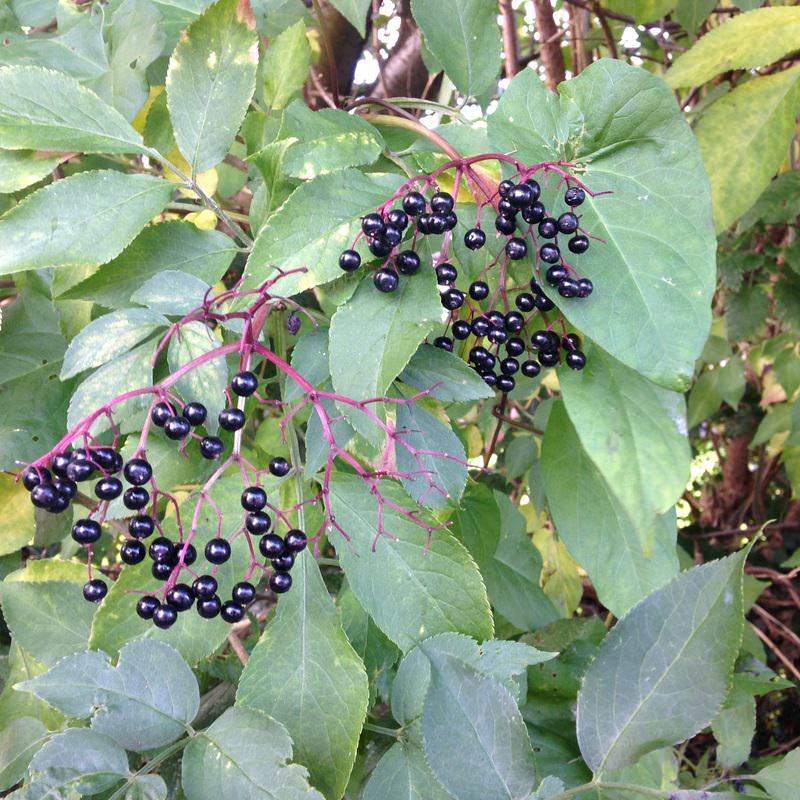
Chest Tree” as all its parts can be used to treat common ailments. Although the leaves, bark, flowers and berries were once used, it is mainly the flowers and berries that have a modern usage. This is because the bark and leaves, when used internally, are quite strong purgatives.
Elderflowers have been traditionally used for the treatment of cold and flu; when drunk hot in a tea they help you to sweat, thus reducing your temperature and sweating the infection out. They are also great for treating catarrh and hence are not only good for colds but also for hayfever and sinusitis. They also be made into delicious Elderflower Champagne.
Elderberries have many of the same properties as the flowers, but they also contain lots of Vitamin C. They have been the subject of a lot of research which is showing that they are also active against flu viruses; they are able to stop the virus from infecting your cells as well as stopping it spreading. Hence if you take Elderberries from the start of your cold or flu you can reduce the severity and length of your illness. This is great example of how modern research is confirming what we already know from our traditional knowledge.
Folk Lore: The Elder is also known as a magical tree with a wealth of folk lore associated with it. For example there is supposed to be a spirit called Hylde-Moer or Elder-Mother who dwells within the tree and watches over it. If the tree is cut down without the permission of Hyle-Moer, she is said to haunt those who do so. Hence before making a cut it is traditional to say: “Elder Mother, give me some of your wood and I will give thee some of mine when it grows in the forest”. If you don’t, well you have been warned!
Once I’d harvested sufficient berries I returned home to rinse them in some cold water to take off any dirt and removed them from the stalks (any stalks left in the mix would make it taste quite bitter) and then I was ready to make my favourite immune tonic.
Elderberry Syrup Recipe:
Put your berries into a pan and add just enough water to cover the bottom of the pan. Bring them slowly to the boil and simmer for about 20 minutes with the lid on until they have released their juice.
Once cool, pour the juice and berries through some muslin into a bowl. Wearing rubber gloves squeeze the rest of the juice from the berries.
Measure how much juice you have and for every 500ml of juice, add 500g of sugar, 20 cloves, 1 stick of cinnamon, 2 star anise and 1 inch cube of chopped fresh ginger. (I also often add half a liquorice stick to this mix)
Heat gently while the sugar dissolves then bring to the boil and simmer hard for 5 minutes.
Strain through a sieve and allow to cool a bit before putting into clean bottles. Keep shaking the bottles every 10 minutes as the syrup cools, don’t forget to label your bottles. If refrigerated the syrup will keep for six months (that’s if it lasts that long!)
I didn’t just add the spices for their flavour they also add to the syrups medicinal action.
Cinnamon (Cinnamomum zeylanicum) is a warming antimicrobial, antiviral and antibacterial. It is also a useful expectorant (i.e. it supports the body in the removal of excess amounts of mucus from the respiratory system).
Cloves (Eugenia caryophyllus) are a powerful antiseptic and mild anaesthetic.
Ginger (Zingiber officinale) can be used for many different complaints during an upper respiratory system infection- it is diffusive and stimulating and is perfect for getting stuck mucus flowing again. A strong ginger tea can relieve congested coughs and stuffy sinuses. It’s also antimicrobial, helping to prevent further infection.
Star anise (Illicium verum) is used as a stimulant and expectorant. It is commonly used to flavour cough mixtures and pastilles. It has also been used as a source of shikimic acid, a primary precursor in the production of anti-influenza drugs such as Tamiflu.
Liquorice (Glycyrrhiza glabra) is a sweet demulcent that soothes mucous membranes; If I have a scratchy sore throat, liquorice tea is often the first thing I reach for. The sweet taste and thick consistency of liquorice root seems to magically erase dry and irritated sore throats. Besides soothing sore throats, liquorice is famously used as a pectoral herb. It soothes coughs, especially those dry and irritating coughs that can keep you up all night. Since sore throats and coughs tend to come together this is a wonderful herb to reach for. Add to that its antiviral and antibacterial properties and you’ve got a useful herb for common upper respiratory infections.
As mentioned its best to keep this syrup in the fridge, where it should last at least 6 months. It can be taken by itself or I also combine it with tinctures such as Echinacea or Wild Indigo.
I’m going to be sharing some more recipes over the next few weeks. Do follow my blog if you think you’d be interested. Looking at my front garden I think the next one will be Hyssop Oxymel – for colds, flu and bronchitis.
For more information about my work as a Medical Herbalist, or if you are interested in whether a consultation could help you have a look at my website
www.bespokebotanicals.co.uk
Disclaimer: All information given above is for educational purposes and is not intended to replace advice from a health care professional. If you have any health problems or are taking any other medication, herbs or supplements always seek the advice of a qualified medical herbalist or other healthcare practitioner prior to starting any new treatments

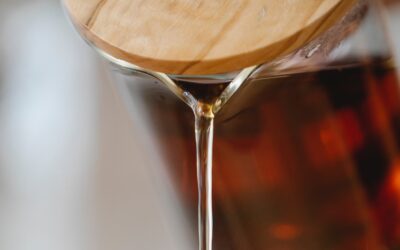
I am lucky to found this website coz more good articles here. Many good quality of information a useful content to share. Anyways, I just wanna share about the benefits of Genuine Haarlem Oil for the health of human especially nowadays were facing pandemic we need to boost our immune system to fight against deadly covid19 or any variant of viruses. Genuine Haarlem Oil has demonstrated its effectiveness in preventing respiratory illness, passive and active smoking, unhealthy diets and rheumatoid arthritis. It is an energy supplement that promotes recovery after exercise, avoids aches and reduces mental fatigue. Revitalizes your nails and helps you to keep a shiny and healthy hair. It is also good for your animal friends.
Thank you and God Bless!
Shop here: https://genuine-haarlem-oil.com/shop
Benefits: https://genuine-haarlem-oil.com/benefits-of-genuine-haarlem-oil/